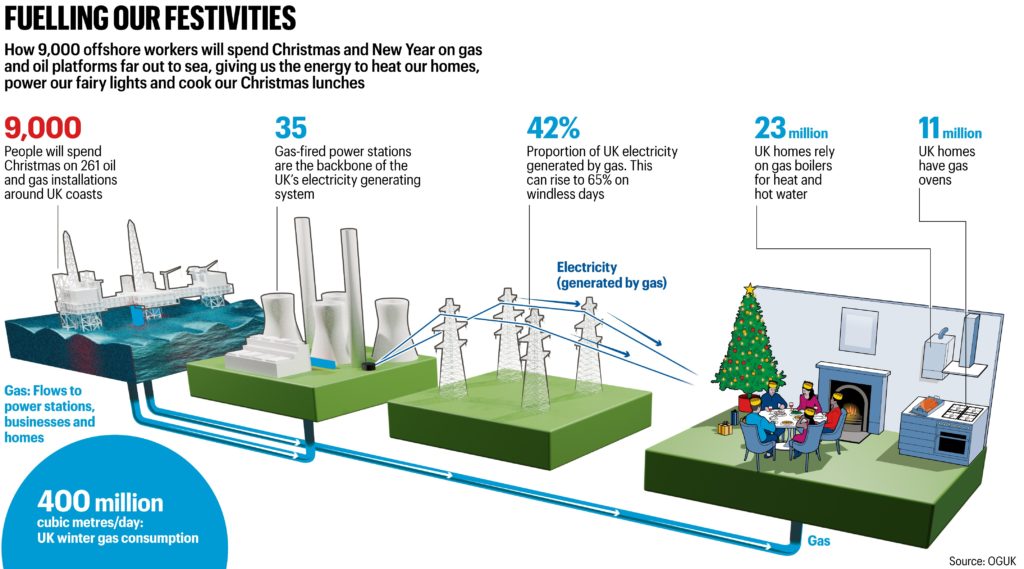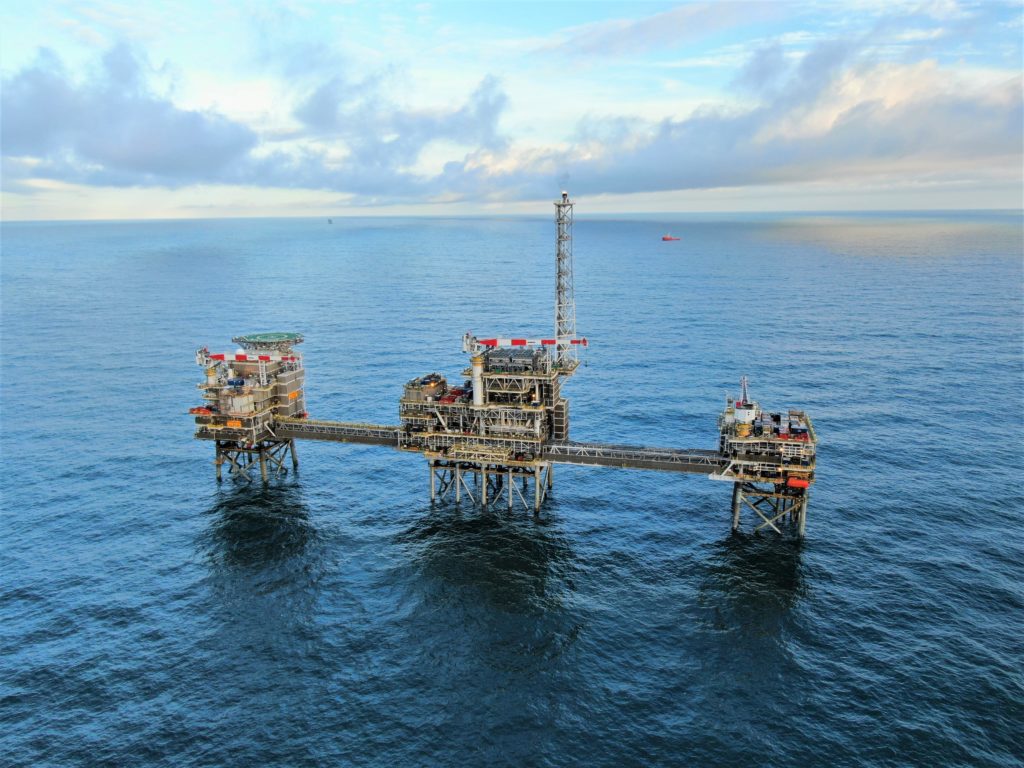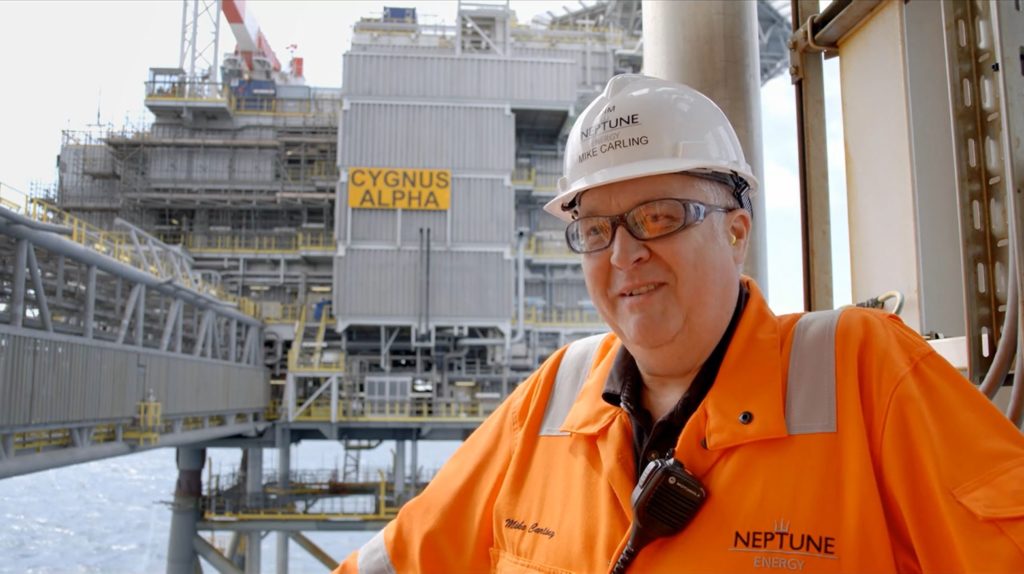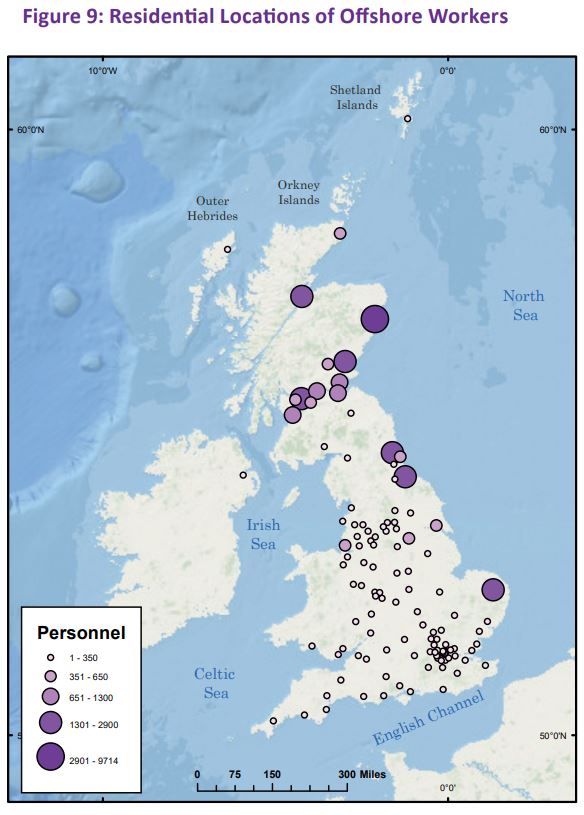Christmas 2021 is giving the UK a sharp reminder of its reliance on its offshore energy industry, with about half the nation’s electricity coming from gas-fired power stations over the last week – and 22 million homes relying directly on gas for heating and cooking.
This weekend the millions of Britons enjoying the festive break are being asked to spare a thought for the 9,000 gas and oil workers currently out at sea on offshore installations and maintenance vessels.

They are helping protect the UK from the energy shortages now hitting much of Europe, caused partly by Russia slashing deliveries to the EU through the Yamal-Europe pipeline according to Reuters. New data from Gazprom, just published, shows how deliveries via that pipeline to the EU last week fell as low as 28 million cubic metres a day – compared with about 110 million cubic metres/day in December 2020.
This, along with other market factors, is threatening to push up global gas prices and consumer bills, prompting plans for crisis meetings on Monday (Dec 27) between the UK government and the companies supplying energy to consumers, according to the Press Association. As those meetings happen, however, the UK’s offshore workforce will out at sea, keeping the energy flowing – including helping supply the UK with the 400 million cubic metres of gas we use on average each winter day to cook our food, heat our homes, run our industries and fuel the power stations that make our electricity.
The UK’s offshore industry supplies about half the nation’s gas needs. This helps to buffer us against shortages in the rest of Europe but means its workers must spend Christmas and often New Year too, on gas and oil installations, and maintenance vessels, that can be more than 200 miles from the UK mainland.
The UK demand for gas over the last week is linked to low winds which reduced the output from wind farms. The winter temperatures also mean that more than 22m homes – about 86% of all households – are separately reliant on gas for heating and hot water. About 11 million homes also have gas ovens.
The UK gets 73% of its total energy from gas and oil. OGUK has long argued that the UK must open new gas and oil fields in its own waters or run the risk of increasing exposure to global energy shortages as well as surging import bills. Such new projects would maintain output rather than boost it – without them UK gas output is predicted to fall 75% by 2030.
Deirdre Michie, OGUK’s chief executive, said: “Our offshore workers are the invisible but vital crew whose efforts provide the energy to keep our homes cosy, power our ovens and festive lights, and even our new games consoles.
“As the rest of us enjoy the festive break we ask everyone to spare a thought for the 9-10,000 people working on oil and gas installations far out in the North Sea who will spend Christmas and New Year away from their families to make sure that energy – in the form of gas and oil – keeps flowing.”
North Sea: Among those workers is Mike Carling, 55, Offshore Installation Manager (OIM) for the Cygnus Alpha gas production platform, in the southern North Sea. It lies about 90 miles equidistant from the coasts of Norfolk and Lincolnshire, and from the cities of Middlesbrough, Sunderland and Newcastle upon Tyne.
His platform – operated by Neptune Energy – supplies 6% of the UK’s gas via a pipeline that comes ashore at Bacton in Norfolk. The structure of the UK gas grid network means that the gas fed into Bacton will mainly be used by customers in London and south-east England.

It means about 1.5 million homes will be depending on Mike and his crew for the gas to heat their homes and cook their Christmas dinners. Neptune, based in London and Aberdeen, also operates the Gjøa platform which is in Norwegian waters but which feeds its gas to the St Fergus terminal near Peterhead, 30 miles north of Aberdeen, from where it supplies Scotland and northern England.
It also means Mike, whose home is in Redcar, near Middlesbrough, will be spending Christmas away from wife Vicki, his two young children, Luke and Lucy; three grown up boys, Matthew, Chris and Joe; and one grandson, Ollie.
Mike said: “For many workers, spending Christmas and/or New Year’s Day offshore is a regular occurrence, but it’s likely there will always be one or two who are spending the festive period away from family and loved ones for the first time. This is where the terrific camaraderie on Cygnus comes into its own, and the crew take special care to look after everyone and keep up the spirits of anyone who’s new to the experience.

“Some will celebrate Christmas with the family after they get back onshore, so its more of a case of postponing the festivities rather than missing out. Ultimately, we know we’re doing an important job, making sure everyone has the energy the need to celebrate Christmas, cook their dinners and enjoy time with their friends and family. It is something of which the offshore workforce can be rightly proud.”
Irish Sea: Christmas day will also see crews working on installations in the Irish Sea off Morecambe, at the north end of Liverpool Bay, 40 miles east of the Isle of Man, 16 miles west of Blackpool and 40 miles north-west of Liverpool. The field supplies more than a billion cubic metres of gas a year, enough for a million homes, feeding into the grid mainly serving north Wales, Merseyside and Lancashire.
An OGUK survey of offshore workers, published this year, found that about 27,000 people are directly involved in oil and gas production, meaning they work largely offshore, on rotas. They come from all over the UK but with particularly strong concentrations in some areas (See linked map and charts).
In England, Norwich, Hull, Middlesbrough, and Newcastle upon Tyne are each home to at least 3,000 offshore workers with more in Merseyside, Manchester, Leeds and Sheffield. Several hundred more live in or around London.

In Scotland the key concentrations are around Inverness, Aberdeen. Dundee, Glasgow and Edinburgh.
How much will the UK be relying on gas supplies this Christmas?
●In 2020 the UK consumed 74 billion cubic metres of gas.
●This equates to about 1,100 cubic metres of gas for each of the UK’s 65m citizens.
●Over the last year gas- fired power stations provided 41% of the UK’s electricity, with much more on occasion to cover when the wind drops. Last week this rose to >60% on some days.
●There are more than 250 manned offshore oil and gas installations around the UK, crewed by 9-10,000 people at any one time
Where does it come from?
●The UK continental shelf – which includes the North Sea – provides half of UK needs.
●In 2020 27 billion cubic metres of gas were imported from Norway by pipeline.
●Another 18 billion cubic metres were imported as liquefied natural gas, half from Qatar and the rest from America and other countries. Some of this gas flows out again.
●UK Gas prices have soared by 520% this year, including an 8% rise on Monday this week – mostly linked to Russia’s decision to cut deliveries to Germany through the Yamal-Europe pipeline to very low levels.
OGUK’s research shows how the UK is already partially reliant on other countries for its gas. The UK government’s latest trade figures show that, in the year to June, the UK paid:
- Norway £5.2 billion for gas plus £6.1 billion for crude oil
- Russia £524 million for gas and £3.2 billion for oil
- Qatar £675m for liquefied natural gas
- USA £2.8 billion for crude oil.
Christmas on Cygnus – Shifts still start at 6am!
Capable of supplying 6% of the UK’s domestic gas demand, the Cygnus facility plays a crucial all year-round, so the 24/7 operation does not stop, even for Christmas Day! The crew will typically focus on safety-critical work or dealing with any new, emerging issues. Everyone begins their day as though it was any other, participating in the shift meetings at 6am before carrying out standard checks and inspection work.
Most of the crew will have the opportunity for some downtime later in the afternoon, making time for the festive lunch for which the catering crew do a phenomenal job. The workers will be treated to a spread of turkey, goose, beef and all the trimmings, so they are most certainly well-looked after by the catering team.
After lunch, everyone participates in the customary “Secret Santa” with a wide variety of weird and wonderful gifts received … a good sense of humour is an important when it comes to this part of the day! There are also a number of competitions, raffles and bingo held.
Everyone has access to phones – including in their cabins – so they will take the opportunity to phone their children, family, friends and partners and wish them a merry Christmas.
Ends
Share this article
